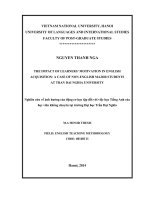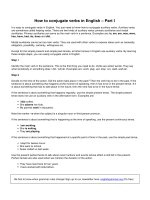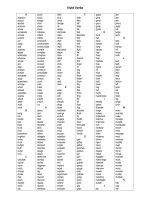comprehensive list of state verbs in english
Bạn đang xem bản rút gọn của tài liệu. Xem và tải ngay bản đầy đủ của tài liệu tại đây (459.53 KB, 1 trang )
Talk a Lot
Intermediate Book 1
Comprehensive List of State Verbs in English
State verbs form a small group of verbs in English which don’t usually have continuous
forms, but use only simple verb forms. They are sometimes called “stative verbs” or
“non-progressive verbs”. For example:
We say: “Annie likes frozen peas.” not “Annie is liking frozen peas.”
We say: “I saw a bird sitting on a branch.” not “I was seeing a bird sitting on a branch.”
We say: “Sue is nearly forty years old.” not “Sue is being nearly forty years old.”
State verbs a
re different from active verbs (also called “dynamic verbs”), which describe
deliberate physical actions, e.g. run, eat, put, etc. They fall into three main groups:
For more fun worksheets, games, and quizzes log onto www.englishbanana.com now!
1. Things that I do in
my head – with my
mind:
These thoughts are already
continuous – or permanent –
without using a continuous
tense
a) gen
eral th
ought
proces
ses:
believe
kno
w
notice
realise
recognise
remember
understand
want
forget *
judge *
think *
wish *
b) negotiations with
other people:
accept
agre
e
disagree
doubt
impress
mean
need
promise
refuse
suspect
mind (care about) *
suppose *
trust *
c) likes and dislikes:
disli
ke
fancy
hate
like
loathe
love
prefer
2. Things that I do
involuntarily – that I
can’t help doing:
We use our senses all the time
when we’re awake – whether
we want to or not! So these
actions are already continuous,
without using a continuous
tense
a) sen
ses
:
hear
smell
feel *
see *
sen
se *
taste *
3. States
whi
ch are
either continuous or
permanent:
These states are already
continuous – or permanent –
without using a continuous
tense
a) gen
eral states of
being:
deserve
last (duration)
matter
seem
sou
nd
be *
keep (continue) *
fit (clothes) *
involve *
lie (position) *
b) poss
ession
:
belon
g
own
possess
have *
owe *
* These verbs can be both state and
active, depending on the context in
which they’re being used, e.g.
State meani
ng: “I have two
garages.” (general state of
ownership) not: “I’m having two
garages.”
Ac
tive meaning: “We’re having
dinner at Emily’s house.” (deliberate
action
)
c) contents:
con
sist of
contain
include *
d) measur
e
ment:
measure *
weig
h *
88









